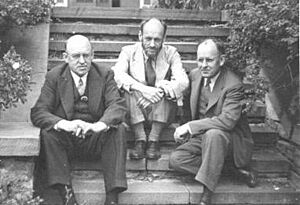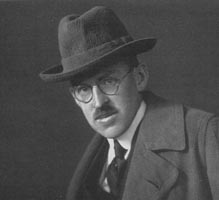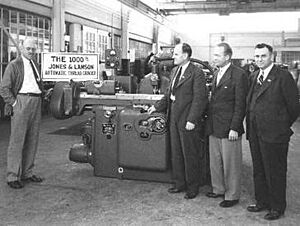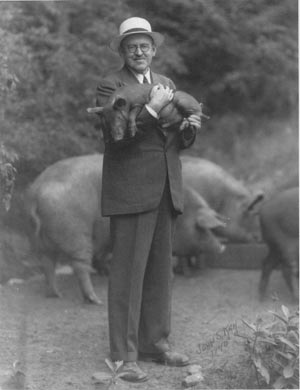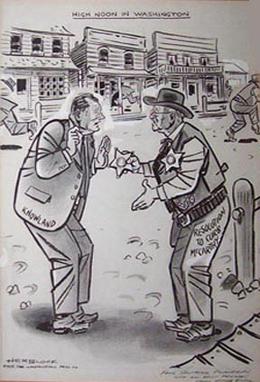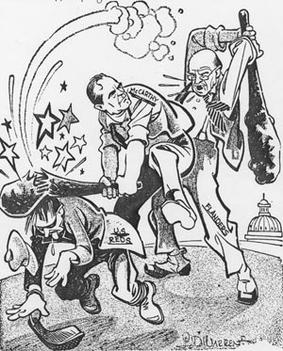Ralph Flanders facts for kids
Quick facts for kids
Ralph Flanders
|
|
|---|---|
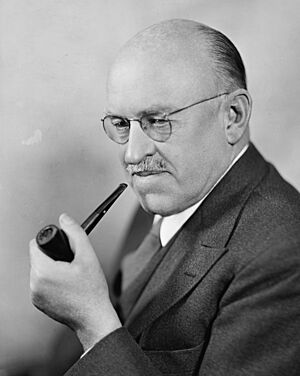 |
|
| United States Senator from Vermont |
|
| In office November 1, 1946 – January 3, 1959 |
|
| Preceded by | Warren Austin |
| Succeeded by | Winston L. Prouty |
| 6th President of the Federal Reserve Bank of Boston | |
| In office May 1, 1944 – February 28, 1946 |
|
| Preceded by | William Paddock |
| Succeeded by | Laurence F. Whittemore |
| Personal details | |
| Born |
Ralph Edward Flanders
September 28, 1880 Barnet, Vermont, U.S. |
| Died | February 19, 1970 (aged 89) Springfield, Vermont, U.S. |
| Resting place | Summer Hill Cemetery, Springfield, Vermont |
| Political party | Republican |
| Spouse | Helen Hartness |
| Children | 3 |
| Relatives | James Hartness (father-in-law) |
| Occupation | Inventor Business executive |
Ralph Edward Flanders (September 28, 1880 – February 19, 1970) was an American mechanical engineer, a leader in industry, and a politician. He served as a Republican U.S. Senator for the state of Vermont.
Ralph grew up on farms in Vermont and Rhode Island. He started as a machinist and draftsman. Later, he became a mechanical engineer. He worked as an editor for a machine tool magazine in New York City for five years. After moving back to Vermont, he became the president of a successful machine tool company.
Flanders used his experience to advise state and national groups on business and money matters. He was also the president of the Boston Federal Reserve Bank for two years. Then, he was elected as a U.S. Senator from Vermont.
He is well-known for trying to officially criticize Senator Joseph McCarthy in 1954. McCarthy had claimed that many Communists and Soviet spies were in the U.S. government. Flanders believed McCarthy's actions were distracting the nation. He felt they were dividing the country, which helped America's enemies. The Senate later voted to officially criticize McCarthy.
Contents
Early Life and School
Ralph Flanders was born in Barnet, Vermont, on September 28, 1880. He was the oldest of nine children. When he was six, his family moved to Lincoln, Rhode Island. His father farmed and also worked on a bookrack he designed. Ralph went to school in Providence and Central Falls. He graduated from Central Falls High School in 1896.
Ralph's Career Journey
Ralph Flanders started his career as a machinist. He then moved into engineering, writing, and managing businesses. He also advised on government policy and worked in banking. Finally, he became a politician when he was elected as a U.S. Senator.
Learning and Early Jobs
After high school, Ralph could not afford college. In 1896, his father helped him get an apprenticeship. This was a two-year training program at the Brown & Sharpe Manufacturing Company. It was a top company that built machine tools. Ralph learned how to operate machines and draw designs. He also took courses from the International Correspondence Schools.
Even without a university degree, Ralph taught himself a lot. He read many books about science, engineering, and other subjects.
Writing About Machines
Ralph started writing early in his career. His articles about machine tools led him to a job as an editor. He worked for Machine magazine in New York City from 1905 to 1910. This job meant he traveled a lot to visit companies. He wrote about new developments in the machine tool industry. This helped him meet many important people in the field.
In 1910, he moved to Springfield, Vermont. He took a job at a machine tool company there. He kept writing throughout his life. In 1938, he won a medal for his technical writing.
Engineering and Inventions
Ralph's first big experience in machine design was helping to create a box-folding machine. In 1910, he became a mechanical engineer for the Fellows Gear Shaper Company in Vermont. He was already friends with James Hartness, who ran another company in town. In 1911, Ralph married James Hartness's daughter, Helen.
Soon after, Ralph joined James Hartness's company, Jones & Lamson Machine Company (J&L). He helped redesign a machine called the Fay automatic lathe. This made it work faster and more accurately. In 1933, he became the president of J&L. He made the company use a continuous production line. This helped them build machines faster, like a factory assembly line. By 1923, he had over twenty patents for his inventions at J&L.
Ralph and his brother, Ernest, also helped create machines that could grind screw threads. These machines made screws more accurately. In 1942, the brothers received an award for this invention. Their work also helped make turbine blades for jet aircraft much faster. This was very important for making jet engines.
Helping Industry and Society
Ralph Flanders became the president of the National Machine-Tool Builders Association in 1923. He also led the American Society of Mechanical Engineers (ASME) from 1934 to 1936. He worked on setting international standards for screw threads.
During the Great Depression, Ralph started writing about how technology affected people. He believed in using "human values" to achieve a good life. He wanted to help everyone find jobs.
In 1933, President Franklin D. Roosevelt asked Ralph to join a group called the Business Advisory Council. This group gave advice to the government about business. Ralph led a committee on unemployment. He suggested ways to help people find jobs.
Ralph also worked with the National Recovery Administration (NRA). This group tried to help businesses and workers during the Depression. In 1937, Vermont Governor George Aiken asked Ralph to join two commissions. One studied how to improve dairy farming in Vermont. The other worked on flood control after the massive floods of 1927.
In 1940, Ralph became president of the New England Council. This group studied business in the New England states. He also warned people about the U.S. possibly joining World War II. After the war, he helped a group that planned how the nation could return to a peacetime economy.
Banking and Investments
Starting in the 1930s, Ralph Flanders served on the boards of several important organizations. These included the Federal Reserve Bank of Boston and the Massachusetts Institute of Technology.
In 1944, he was elected president of the Federal Reserve Bank of Boston in Boston. During his time there, the bank helped create the Boston Port Authority. This group worked to improve New England's ability to send and receive goods by cargo ship.
In 1946, Ralph helped start American Research & Development (AR&D). This was one of the first venture capital companies. It invested in new, small companies to help them grow.
Politics and Public Service
In 1940, Ralph Flanders ran for the United States Senate. He lost to George Aiken, who was the popular Governor of Vermont. Ralph felt that he let his campaign advisors make too many decisions. For example, a campaign photo showed him in a fancy suit holding a piglet. People thought it looked fake. This experience taught him that he needed to "be myself."
In 1946, Senator Warren Austin resigned. Ralph Flanders won the special election to take his place. He was easily reelected in 1952. He decided not to run for a third term in 1958.
Senate Work and Beliefs
In the Senate, Ralph Flanders often voted more conservatively than his fellow Vermont Senator, George Aiken. This showed his business background. In his second term, he joined important committees. These included the Joint Economic Committee, the Finance Committee, and the Committee on Armed Services.
Ralph believed that conservatism and liberalism could work together. He felt that liberalism focused on the well-being of individuals. Conservatism, for him, was about protecting important organizations that serve people.
On Right and Wrong in Policy
Ralph Flanders grew up with strong religious beliefs. This led him to believe in "moral law." He felt that honesty, kindness, responsibility, and wisdom were important for society to succeed. He saw these values as universal.
He thought the Marshall Plan was a good example of moral law in action. This plan helped rebuild Europe after World War II. Ralph believed its real goal was to stop Communism by helping Europe's economy.
On Workers and Businesses
Ralph believed that individuals, workers, businesses, and the government all shared a responsibility for jobs.
- Individuals should be productive and look for work.
- Worker groups should not ask for wages that hurt job growth.
- Businesses should work well to create more jobs.
- Governments should help businesses grow and encourage new ventures.
Ralph thought that wage increases should be linked to how much more productive workers become. He believed that gains from productivity should be shared. Workers would get higher wages, companies would get more profits, and consumers would get lower prices. This would benefit everyone.
Ralph had good relationships with worker unions. His company, Jones & Lamson, was the first in Springfield, Vermont, to have a union.
On Cold War Policies
Ralph Flanders was very interested in policies related to the Cold War. He worried about Communism spreading around the world. He felt that President Harry S. Truman was a good president. However, he thought Truman made mistakes by trying to please the Soviets.
Ralph believed that spending so much on defense was not smart if the Soviet government wanted to avoid nuclear war. He pushed for talks about disarmament while developing atomic and hydrogen bombs. He felt that getting the Soviet government to agree on arms control was most important.
Challenging Joseph McCarthy
Ralph Flanders was an early and strong critic of Senator Joseph McCarthy. He felt McCarthy was "misdirecting" efforts to fight Communism. He believed McCarthy's actions made other countries lose respect for the U.S. Ralph thought the nation should focus on the "alarming world-wide advance of Communist power." He worried that only the U.S. and Canada would be left free.
On March 9, 1954, Ralph spoke to the Senate about his concerns. His speech was a big deal. Many people called and sent telegrams to support him. One message said his speech was "a fine example of Vermont courage, humor and decency."
Not everyone agreed. Some people criticized Ralph. One newspaper owner called him "stupid" for challenging McCarthy.
On June 1, 1954, Ralph spoke to the Senate again. He compared McCarthy to "Dennis the Menace" from cartoons. He said McCarthy was dividing the nation. He warned that "in every country in which communism has taken over, the beginning has been a successful campaign of division and confusion." He even said, "Were the junior Senator from Wisconsin in the pay of the communists, he could not have done a better job for them."
On June 11, 1954, Ralph introduced a plan to officially criticize McCarthy. He changed his plan to fit Senate rules. The plan said McCarthy acted improperly by not working with Senate committees. It also said he spoke badly about the committee that was looking into his actions. Many business leaders, labor leaders, and educators supported Ralph's plan.
On December 2, 1954, the Senate voted 65 to 22 to officially criticize McCarthy. This was a major event in U.S. history.
Personal Life
In 1911, Ralph Flanders married Helen Edith Hartness. She was the daughter of inventor and industrialist James Hartness. They lived in Springfield, Vermont. Ralph and Helen had three children: Elizabeth, Anna (Nancy), and James.
Ralph Flanders's Legacy
Ralph Flanders wrote or co-wrote eight books. These included his autobiography, Senator from Vermont. He wrote about unemployment, inflation, and how workers and management could cooperate. He also wrote about his belief that "moral law is natural law." He felt this should be part of everyone's education.
His papers are kept at Syracuse University Library and the University of Vermont's Bailey-Howe Library.
Ralph received more than sixteen honorary degrees from different colleges and universities.
His wife, Helen Hartness Flanders, collected folk songs. She wrote several books about New England ballads.
Ralph Flanders passed away in Springfield on February 19, 1970. He was buried in Summer Hill Cemetery in Springfield.
Impact on Vermont Politics
Ralph Flanders's time in the Senate has continued to inspire Vermont politicians. Senator Jim Jeffords mentioned Flanders in a speech in 2001. He said Flanders was one of five Vermont politicians who "spoke their minds" and guided their party. Senator Patrick Leahy also cited Flanders as someone who showed "the importance of standing firm in your beliefs." In 2016, Congressman Peter Welch said he wanted to be like Flanders when disagreeing with policies. He said Flanders "stood up and said no, this has got to end."
 | Bayard Rustin |
 | Jeannette Carter |
 | Jeremiah A. Brown |


